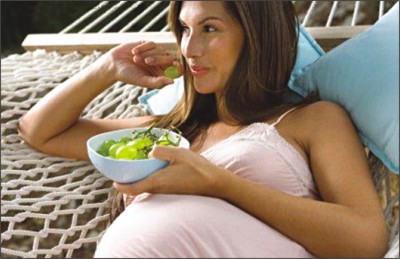Pregnant teenagers need more nutrients
Pregnant teenagers need more nutrients than adult women, because they are still growing. Teenagers may give birth to underweight children, because their body is in competition with that of the fetus to ensure its proper nutrients. Anemia is more common in adolescent girls than in adult women. Calcium intake during this period is also an important factor for young women who have not yet developed all the bone, and an inadequate intake of calcium may increase risk of later osteoporosis.
What about cravings during pregnancy
Some women crave for certain foods during pregnancy. According to some theories, every desire highlight a deficiency in the diet. Most dismiss this idea, nutritionists recommend that cravings be taken into account, as long as you do not become predominant, replacing other more important foods.
Discomfort and anxiety during pregnancy
During pregnancy, women often suffer from problems that may influence the types of foods they eat, and this may affect the overall level of nutrition during pregnancy. These issues are:
– Morning sickness (in this case, ginger may be helpful)
– Indigestion
– Heartburn
– Constipation (in this case, integral bread, cereals high in bran and some fruits can help)
– Hemorrhoids.
Many women give up physical activity, and this can lead to obesity.
Alcohol consumption during pregnancy
It is not known with certainty if there is a tolerated level of alcohol consumption during pregnancy, so it is important that alcohol be avoided completely during this period. Heavy drinking during pregnancy was associated with underweight birth, birth defects and mental retardation, and facial features deformed.
Listeria infection
Listeria monocytogenes bacteria can infect certain foods. Healthy people may not even be affected, but the risks are substantial for pregnant women. Symptoms may include headaches, and fatigue at first. If untreated, infection with Listeria can lead to severe complications such as septicemia or blood poisoning. The greatest danger hovering over the fetus, increased risk of miscarriage, stillbirth or abortion. A listeria infection is easily treated with antibiotics, but prevention is the best medicine. Certain foods are more prone to contamination than others, among them being:
– Seafood
– Pate
– Sausages, salami or ham
– Unpasteurised food
– Soft cheeses such as Brie and Camembert.
Note:
– A pregnant woman should concentrate on enlarging the consumption of nutrients, and no calories.
– Pregnancy places an additional demand for certain nutrients, including iron, calcium, folate, zinc, magnesium, protein, vitamin C and vitamin B complex
– Infection with the bacterium Listeria, which comes from eating contaminated food, may constitute a serious threat to future child health.
